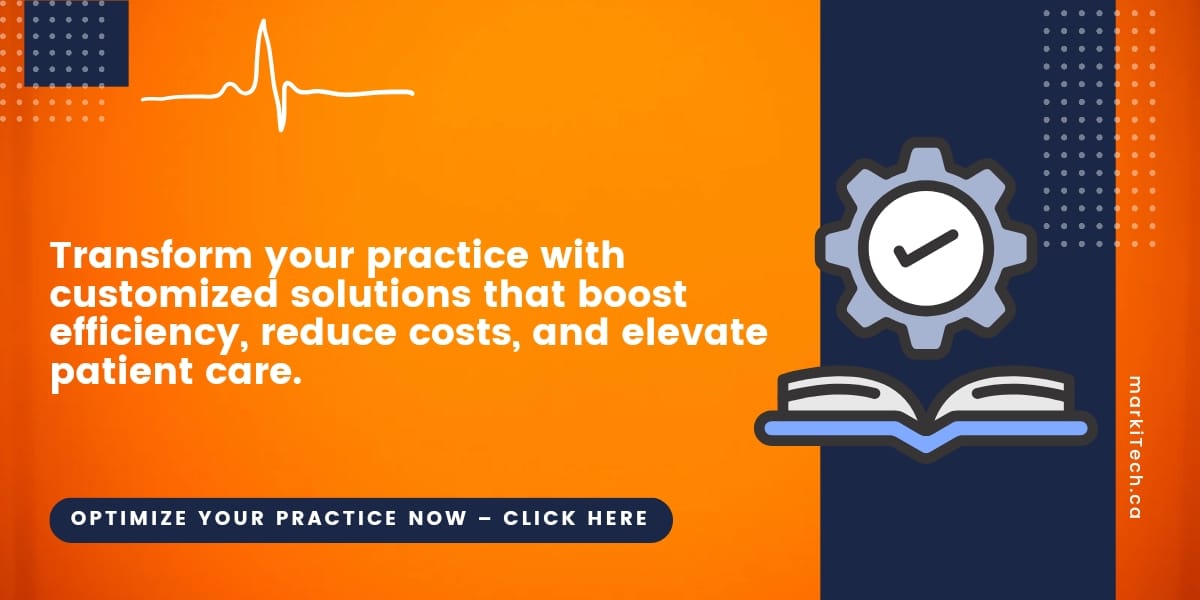At MarkiTech, we always ask: How can we use technology to help people? One of the most exciting answers we’ve found is Artificial Intelligence. When used thoughtfully, we’ve seen how AI can change how healthcare works—not just for doctors and providers but for the patients who rely on them.
If you’ve ever tried to book a doctor’s appointment, waited too long for test results, or struggled to get mental health support, you already know that the healthcare system can be frustrating. That’s where AI is beginning to step in and make things easier – for both patients and professionals.
Let’s discuss how this is happening and what it means for you.
Why Healthcare Needs Smarter Solutions
Healthcare is under pressure. Clinics are overwhelmed, mental health needs are rising, and many people feel like just another number in a crowded system. As patients, we want answers, comfort, and care that feel personal. As providers, there’s never enough time.
That’s where AI can help—not by replacing humans, but by supporting them.
Chatbots Are Helping Where It Counts
Imagine messaging a support line at your clinic and instantly getting help booking an appointment, checking your insurance, or understanding your lab results. That’s not a fantasy anymore. A chatbot for healthcare can now handle these tasks in real-time, 24/7.
At MarkiTech, we’ve worked on tools that can do just that. These chatbots don’t need sleep, don’t get frustrated, and they can quickly connect you with the information you need. That way, when something more serious comes up, the human team has more time to focus on what matters most—caring for patients.
AI for Mental Health: Support That’s Always There
One of the places AI is quietly making a big difference is in mental health. We all know how hard it can be to ask for help. Long wait times, busy hotlines, or embarrassment can make people give up before they even start.
That’s why AI for mental health is something we care deeply about. AI can be there any time of day or night to listen, ask helpful questions, and guide someone toward the support they need. It’s not meant to replace therapy but can help people feel seen and heard when they need it most.
Some people find it easier to open up to a non-judgmental digital helper at first. That first conversation, even if it’s with a chatbot, can be the step that encourages them to seek more support.
Real Help, Real-Time
We’ve seen firsthand how behavioral health technology gives people better ways to manage stress, track mood, and stay connected to care providers. AI can remind patients to take medication, offer daily check-ins, or give tips based on how someone’s feeling.
It’s like having a smart assistant who never misses a thing for providers. It can flag early signs of trouble, gather information from multiple sources, and give clear updates on how a patient is doing. This kind of help saves time and can even save lives.
Keeping It Human
When people hear “AI in healthcare,” some worry that machines are replacing doctors. That’s not what we believe in at all. We believe AI should always support genuine human care—not replace it. The goal is to remove some stress and busy work so doctors and nurses can spend more time with patients. It also helps patients feel more supported, even between visits.
We’ve learned that people want connection. They want answers that make sense. And they want to know someone’s paying attention. That’s the job AI can do well when it’s built with care and tested with honest feedback.
Things to Keep in Mind
If you’re thinking about using AI development for your healthcare service or practice, here are a few things we’ve learned along the way:
- Start small. You don’t need a big system right away. A single chatbot can help with appointment scheduling and save hours every week.
- Talk to your team. Talk to your team and make sure everyone understands what AI can do—and what it won’t. AI should support your staff, not confuse them.
- Put people first. Choose tools that focus on patient needs. It’s not just about efficiency. It’s about care that feels personal and thoughtful.
- Ask for feedback. Patients and staff will tell you what’s working and what’s not. Listen to them and make changes as needed.
What’s Next
AI is already making care more available, thoughtful, and personal. From scheduling help to support mental health, it’s clear that technology can make a real difference when done right.
We’re here to talk if you’re curious about how AI can help your healthcare organization, or if you’re a patient hoping for easier and faster support.
Conclusion
At MarkiTech, we believe in building tools that make life better. Not more complicated. Not more robotic. Just better. We’re not just developing tech. We’re creating real solutions that help real people. And we’re just getting started.





